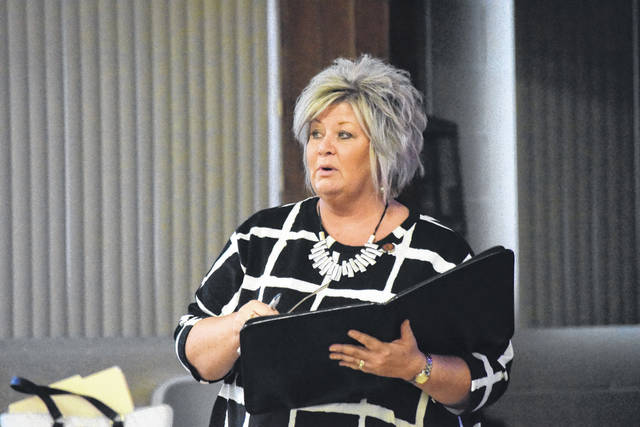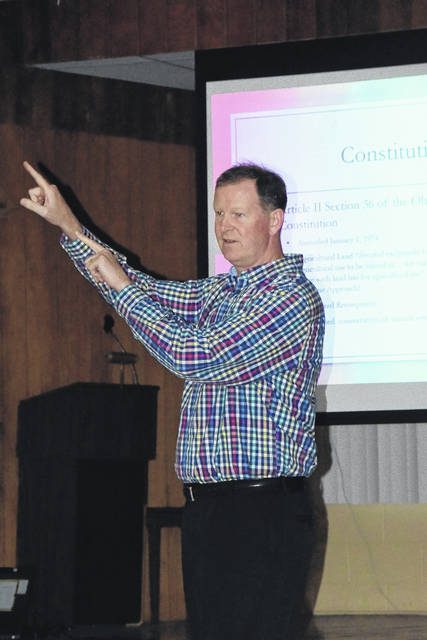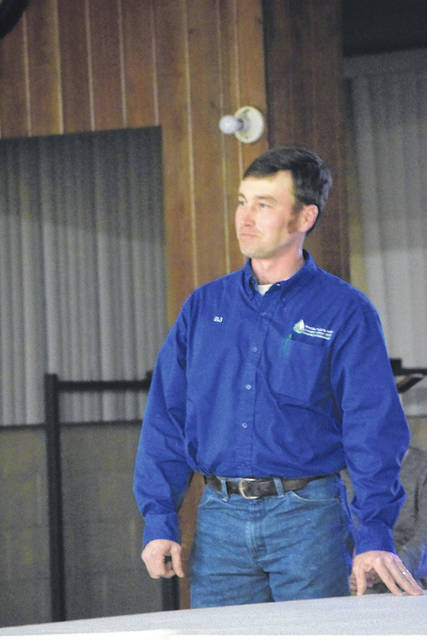


EATON — The Current Agricultural Use Value (CAUV) program allows farmland devoted exclusively to commercial agriculture to be valued based on the agricultural use of the land rather than its “highest and best” potential use, resulting in a substantially lower tax bill for working farmers.
The Preble County Auditor’s Office held a meeting about the program on Wednesday, March 7. Together, Preble County Auditor Lavon Wright, Richard Hoffman, and BJ Price with PC Soil and Water shared the history of the program and what they see changing in the future — specifically with House Bill 49.
“Tonight is all about good news, for those of you who are in CAUV, and are doing either contracted CRPs or have conversation practices. We hope this evening is informative for you and will assist you in all of your conservation needs,” Wright said.
She explained, Hoffman is her lawyer and has experience with CAUV. His purpose was to explain why CAUV had been up the last several years, and why it is now dropping.
Hoffman said, “Just to cover background issues about why this is important. Residential and agricultural groups are tied together and they make class one. Why that’s important is because the farm and town are connected via taxation. What happens, as over the last years, with your CAUV values took those sharp increases, as you all saw and felt, there is a tax shift from the farm to the town to the farm. So not only are your values going up, but you are paying more at the same time.
“What we are experiencing now is just the opposite. What is going to happen now that your CAUV values are going down, we are going to get that tax shift going back to the farm back to those residential groups. It is going to be something new for them. What we’ve seen since 2005 to now, it’s been a one-way roller-coaster up for you guys. Now, we’ve reached that peak where it is going down.”
Class two is all other land and improvements, including commercial and industrial.
“The whole idea of CAUV is to capitalize the income you’re making off the farm. We look at the income and the capitalization portion, your cap rate, is an amalgamation of equity return versus interest rate. We put that together and average it over a couple years, and we will divide that by your income,” he said.
“The problem we run into is whenever you take a number and divide it by a lower and lower number, the problem is you’re going to get a larger result. From 2005-2015, that is what you guys saw.”
He then looked at the history of CAUV Cap Rates. He added that the CAP Rate is so important, because of how it directly affects CAUV values. Farm income on 20 acres at $300 per acres and with a CAP Rate of 10 percent is valued at $60,000. The same farm income of $6,000 on the same 20 acres with a CAP Rate of 6.2 percent is valued at $96,774. The same farm income of $6,000 on the same 20 acres with a CAP Rate of eight percent is valued at $75,000.
In Preble County, the average number of parcels in CAUV is 4,755. Now, the value of land is starting to decrease. From $667,475,400 in 2014 to $495,489,610 in 2017.
In 2016, Senate Bill 246 and House Bill 398 were introduced. In 2017, Senate Bill 36 and House Bill 49 were introduced. HB49 has two major changes, according to Hoffman. The first is a change to Capitalization Rate and the second is that all eligible conservation land is to be valued at the minimum value of $230 per acre.
Price added, “We’re not here to get you folks out, we’re here to explain this to you so you’re not lost.”




